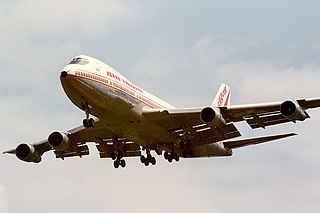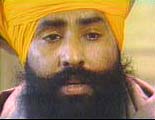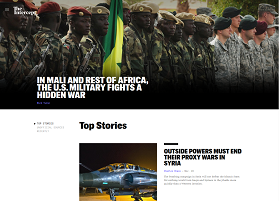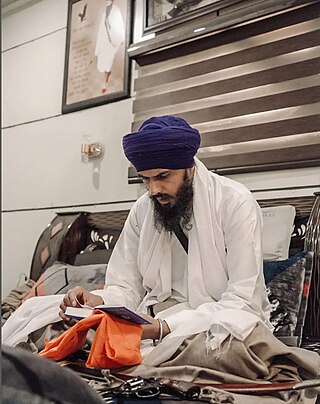
The Khalistan movement is a separatist movement seeking to create a homeland for Sikhs by establishing an ethno‐religious sovereign state called Khalistan in the Punjab region. The proposed boundaries of Khalistan vary between different groups; some suggest the entirety of the Sikh-majority Indian state of Punjab, while larger claims include Pakistani Punjab and other parts of North India such as Chandigarh, Haryana, and Himachal Pradesh. Shimla and Lahore have been proposed as the capital of Khalistan.

Air India Flight 182 was a passenger flight operating on the Montreal–London–Delhi–Mumbai route, that on 23 June 1985, disintegrated over the Atlantic Ocean as a result of an explosion from a bomb planted by Canadian Sikh terrorists. It was operated using a Boeing 747-237B registered VT-EFO. The incident happened en route from Montreal to London at an altitude of 31,000 feet (9,400 m). The remnants of the aircraft fell into the sea approximately 190 kilometres off the coast of Ireland, killing all 329 people on board, including 268 Canadian citizens, 27 British citizens, and 24 Indian citizens. The bombing of Air India Flight 182 is the worst terrorist attack in Canadian history, the deadliest aviation incident in the history of Air India and was the world's deadliest act of aviation terrorism until the September 11 attacks in 2001. The mastermind behind the bombing was believed to be Inderjit Singh Reyat, a dual British-Canadian national, who pleaded guilty in 2003 and Talwinder Singh Parmar, a Canadian Sikh separatist leader, who was one of the key individuals associated with the militant group Babbar Khalsa.
Warren James Kinsella is a Canadian lawyer, author, musician, political consultant, and commentator. Kinsella has written commentary in most of Canada's major newspapers and several magazines, including The Globe and Mail, the Toronto Sun, Ottawa Citizen, the National Post,The Walrus, and Postmedia newspapers. He appeared regularly on the Sun News Network. Kinsella is the founder of the Daisy Consulting Group, a Toronto-based firm that engages in paid political campaign strategy work, lobbying and communications crisis management.

Morley Safer was a Canadian-American broadcast journalist, reporter, and correspondent for CBS News. He was best known for his long tenure on the news magazine 60 Minutes, whose cast he joined in 1970 after its second year on television. He was the longest-serving reporter on 60 Minutes, the most watched and most profitable program in television history.

Talwinder Singh Parmar was a Sikh militant and the mastermind of the 1985 Air India Flight 182 bombing, which killed 329 people. It was the worst single incident of aviation terrorism in history until the September 11 attacks in the United States. In addition, another bomb was meant to explode aboard Air India Flight 301 in Japan the same day, but it exploded while the plane was still grounded, killing two people. Parmar was also the founder, leader, and Jathedar of Babbar Khalsa International (BKI), better known as Babbar Khalsa, a Sikh militant group involved in the Khalistan movement.
Neil Macdonald is a Canadian journalist with the Canadian Broadcasting Corporation, and a former senior correspondent for CBC News The National. He is married to former CTV News bureau Chief Joyce Napier.

Arthur Kent is a Canadian television journalist and author. He rose to international prominence during the 1991 Persian Gulf War during which he acquired the nickname "The Scud Stud". He is the brother of Canada's former Minister of the Environment Peter Kent.

Tara Singh Hayer was an Indian-Canadian newspaper publisher and editor who was murdered after his outspoken criticism of fundamentalist violence and terrorism. In particular, he was a key witness in the trial of the Air India Flight 182 bombing.

Saša Petricic is a Canadian journalist and photographer. He is currently a senior correspondent and videojournalist for CBC Television's The National and other CBC News programs, based in Toronto and specializing in world news. He previously spent five years as the CBC's Asia Correspondent, based in Beijing and four years covering the Middle East from Jerusalem.

David Common is a Canadian journalist, best known as a correspondent and anchor for CBC News, and cohost with Asha Tomlinson and Charlsie Agro of CBC Television's consumer affairs newsmagazine Marketplace. As of October 16, 2023, he is the host of CBC Radio’s Metro Morning.

Canada and India have had longstanding bilateral relations. India has become one of the top source countries for immigration to Canada with Indian diaspora increasing to over one million as of 2022. According to Immigration, Refugees and Citizenship Canada (IRCC) data, of the more than 800,000 international students in Canada in 2022, 40 percent were from India, constituting the largest international student group in Canada. Bilateral trade between India and Canada has seen significant growth in recent years, reaching $8.16 billion in 2023. Both Canada and India are member nations of the Commonwealth association, and also part of G20, a group of world's largest economies.

Amarjeet Sohi is a Canadian politician serving as the 36th and current mayor of Edmonton since October 26, 2021. Sohi previously sat as a Liberal member of Parliament (MP) and served in the federal Cabinet from 2015 to 2018 as the minister of infrastructure and communities, and from 2018 to 2019 as the minister of natural resources.

World Sikh Organization (WSO) is a Sikh religious and non-profit organization whose 1984 founding goal was "to provide an effective, credible voice to represent Sikh interests on the world stage", after Operation Blue Star. Its stated goal is "to promote and protect the interests of the Sikh Diaspora", and "promote and advocate for" human rights. Tejinder Singh Sidhu currently serves as President of the organization.
This article lists some of the controversies in the 2011 Canadian federal election.

The Intercept is an American left-wing nonprofit news organization that publishes articles and podcasts online.
Jaspal Singh Atwal is an Indo-Canadian businessman convicted of attempted murder for his role in the 1986 attempt to assassinate Punjab minister Malkiat Singh Sidhu. A Khalistani sympathizer and member of the now-banned militant group International Sikh Youth Federation, he was also involved in the 1985 attack of Ujjal Dosanjh, a strong opposer of the Khalistani movement who would later become the 33rd Premier of British Columbia. In 2010, he was accused of being part of an automobile fraud case but was ruled out by the Supreme Court of Canada. In February 2018, Atwal gained national attention when he was invited by Canadian prime minister Justin Trudeau to a reception during a visit to India and would eventually have his invitation revoked the next day. That same year, he was arrested for issuing death threats to a local radio in British Columbia.

Sikhs for Justice (SFJ) is a US-based secessionist group that supports the formation of Khalistan. Founded and primarily headed by lawyer Gurpatwant Singh Pannun in 2009, the organization was created in response to the lack of litigation to convict the murders and massacres of Sikhs after Prime Minister Indira Gandhi was assassinated by her Sikh bodyguards in 1984.

Amritpal Singh Sandhu is a radical Indian pro-Khalistan separatist, a self-styled Sikh preacher and politician. He is a Member of Parliament in the Lok Sabha representing the constituency of Khadoor Sahib since 2024.

Hardeep Singh Nijjar was a Canadian Sikh involved with the Khalistan movement, which calls for an independent Sikh state.














